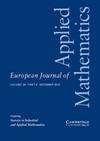显著(1+2)维Fokker-Planck方程的扩展对称性分析
IF 1.1
4区 数学
Q1 MATHEMATICS, APPLIED
引用次数: 4
摘要
摘要本文对具有三个自变量的超抛物型Fokker-Planck方程进行了扩展对称分析,该方程又称为Kolmogorov方程,因其显著的对称性而在该类Fokker-Planck方程中被挑选出来。特别地,它的本质李不变代数是八维的,这是上述类中的最大维数。用直接法计算了Fokker-Planck方程的完全点对称伪群,分析了它的结构,并找出了它的本质子群。在列出该方程的本质和极大李不变代数的等价一二维子代数之后,我们详尽地分类了它的李约简,进行了它特有的广义约简,并将后者的约简与李对称算子的迭代作用生成解联系起来。因此,我们构造了Fokker-Planck方程的广泛精确解族,特别是那些由任意有限数量的(1+1)维线性热方程的任意解参数化的解族。我们还建立了Fokker-Planck方程与(1+2)维Kramers方程的点相似性,这些Kramers方程的基本李不变代数是8维的,这使得我们可以很容易地找到这些Kramers方程的广泛的精确解族。本文章由计算机程序翻译,如有差异,请以英文原文为准。
Extended symmetry analysis of remarkable (1+2)-dimensional Fokker–Planck equation
Abstract We carry out the extended symmetry analysis of an ultraparabolic Fokker–Planck equation with three independent variables, which is also called the Kolmogorov equation and is singled out within the class of such Fokker–Planck equations by its remarkable symmetry properties. In particular, its essential Lie invariance algebra is eight-dimensional, which is the maximum dimension within the above class. We compute the complete point symmetry pseudogroup of the Fokker–Planck equation using the direct method, analyse its structure and single out its essential subgroup. After listing inequivalent one- and two-dimensional subalgebras of the essential and maximal Lie invariance algebras of this equation, we exhaustively classify its Lie reductions, carry out its peculiar generalised reductions and relate the latter reductions to generating solutions with iterative action of Lie-symmetry operators. As a result, we construct wide families of exact solutions of the Fokker–Planck equation, in particular, those parameterised by an arbitrary finite number of arbitrary solutions of the (1+1)-dimensional linear heat equation. We also establish the point similarity of the Fokker–Planck equation to the (1+2)-dimensional Kramers equations whose essential Lie invariance algebras are eight-dimensional, which allows us to find wide families of exact solutions of these Kramers equations in an easy way.
求助全文
通过发布文献求助,成功后即可免费获取论文全文。
去求助
来源期刊
CiteScore
4.70
自引率
0.00%
发文量
31
审稿时长
>12 weeks
期刊介绍:
Since 2008 EJAM surveys have been expanded to cover Applied and Industrial Mathematics. Coverage of the journal has been strengthened in probabilistic applications, while still focusing on those areas of applied mathematics inspired by real-world applications, and at the same time fostering the development of theoretical methods with a broad range of applicability. Survey papers contain reviews of emerging areas of mathematics, either in core areas or with relevance to users in industry and other disciplines. Research papers may be in any area of applied mathematics, with special emphasis on new mathematical ideas, relevant to modelling and analysis in modern science and technology, and the development of interesting mathematical methods of wide applicability.

 求助内容:
求助内容: 应助结果提醒方式:
应助结果提醒方式:


